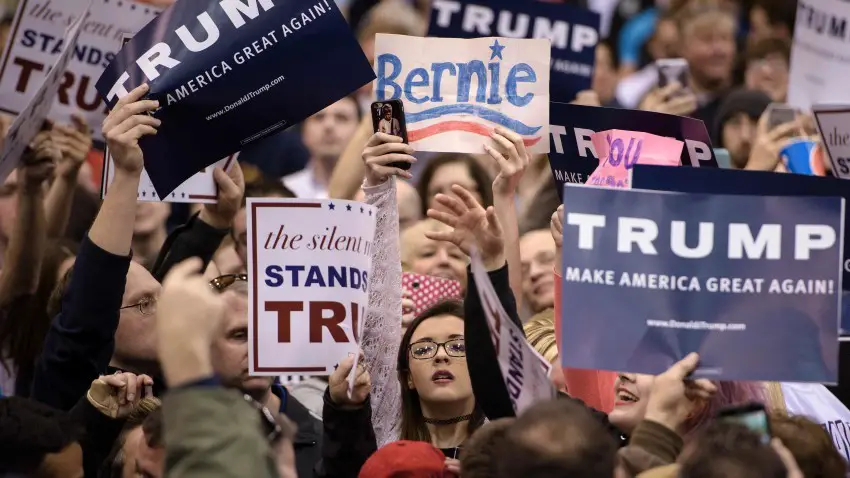As we’ve seen in these pages, no one is more devoted than a Bernie Sanders supporter. The depth of emotion is incredible, and so the question is, to what degree will reason enter into the Bernie fan’s choice in November? After all, “the enemy” for several months has been Hillary Clinton.
Josh Zeitz, of Politico, looks back to 1968, to see how disaffected liberals reacted to their loss.
One of the great unknowns of the current presidential election cycle—a cycle without recent precedent in its unusual twists and turns—is whether the fall campaign will see a convergence of the populist left and the populist right. Could a chunk of Bernie Sanders’ anti-establishment base really vote for GOP outsider Donald Trump in November? Could it be enough to swing the election in Trump’s favor? . . .
History shows us that when disenchantment with establishment politics and institutions is high, as it is today, voters don’t always vote along ideological lines. . .
In 1968. . .insurgent liberal. . .Eugene McCarthy. . .captured a popular wave of anti-establishment sentiment but failed to win their party’s nomination. In November, many of their supporters veered sharply to the right, voting for candidates who didn’t necessarily share their political views but who served as a convenient outlet for the expression of their broader frustrations. . .
When voters see America as a nation in decline, and when they attribute the fraying of its economic and social fabric to elite conspiracy, they sometimes cast their votes based on emotion rather than logic. . .The only thing that did seem to unite McCarthy’s supporters was a powerful disdain for the status quo. . .
[Meanwhile, George] Wallace tapped into a strong reserve of voter anger. . .He dubbed Nixon and Humphrey “Tweedledee and Tweedledum” and claimed there was not “a dime’s worth of difference” between them. . .But what if 20 percent of Sanders voters in key states defect to Trump, as they did in previous years? Could it be enough to swing an election?
The author asks if Bernie fans will vote for Trump, since they are so turned off by the establishment, and Trump is so unorthodox. But Trump has worked hard to become “orthodox” recently, and by November, he may be, as Wallace would say, “Tweedledee.” And there already is a third-party alternative, as FiveThirtyEight notes.
Gary Johnson might be on the verge of becoming a household name. . .he’s the former governor of New Mexico, likely Libertarian candidate for president, and he’s polling at 10 percent in two recently released national polls against Hillary Clinton and Donald Trump.
A Morning Consult survey published Tuesday and found Clinton getting 38 percent of the vote, Trump 35 and Johnson 10, with 17 percent undecided. A Fox News poll conducted from May 14-17 showed Trump leading over Clinton, 42 percent to 39 percent, but Johnson at 10 percent as well. [And] a Monmouth University survey found that in a three-way race, Clinton would get 42 percent, Trump 34 percent and Johnson 11 percent.
Given that Trump and Clinton are sporting historically high negative ratings, Johnson’s polling makes a fair bit of sense; Gary Johnson is neither Donald Trump nor Hillary Clinton.
Ten percent doesn’t sound like much. At this point in 1992, Ross Perot was polling at 30 to 35 percent. Perot might have actually won as an independent, but he flipped out and withdrew. Winning is possible. And Johnson’s 10% is up from the just 1% he won in 2012—and was at that time, the most successful Libertarian candidate ever.
For those unfamiliar with the Libertarian Party, it is very conservative in economic matters, but is liberal in social matters. It is, therefore, attractive to both disaffected Democrats and Republicans.
While Johnson is not yet nominated by the Libertarian Party, the not-yet-nominated vice presidential candidate gives us more insight, according to Reuters.
“I do think there’s an opening (for us),” William Weld told CNN. The former Massachusetts governor cited polls showing a majority of Americans are not satisfied with either of the 2016 likely major party candidates. . .
Weld said the next step is for the two leading Libertarians–both former Republicans–to be included in presidential polls, where they would need to get 15 percent support to be included in upcoming debates in the fall leading up to the Nov. 8 general election.
“At that point there’s going to be so much attention on the election that I think in the last three weeks money may be just irrelevant. . .”
Weld said. “I’d like to ideally nudge the Democrats toward the economic center, get them away from excessive spending. I would like to get the Republicans to get away from their anti-abortion stance, their queasiness with gays and lesbians being able to live openly and married and peaceably.”
Everyone has been calling for a third-party candidate. It would really be logical for William Kristol to turn his “NeverTrump” third-party search to the Libertarians, whose economic policies align with Kristol’s most favored policies. Trouble is, if a Libertarian won, it might supplant the Republican Party. Kristol wants his third-party candidate to identify as a Republican, so if (when) he or she loses, conservatives will only have one party to go back to.
But if Bernie fans want to repudiate the major parties, they could really make a difference by going Libertarian. And as Johnson and Weld say, if they can bump their 10% polling up to just 15%, they’ll have to be included in the debates, and it’ll be a whole new ball game. Batter up?
Donate Now to Support Election Central
- Help defend independent journalism
- Directly support this website and our efforts
